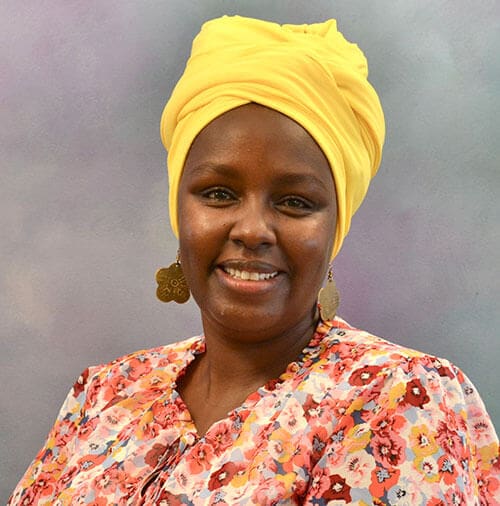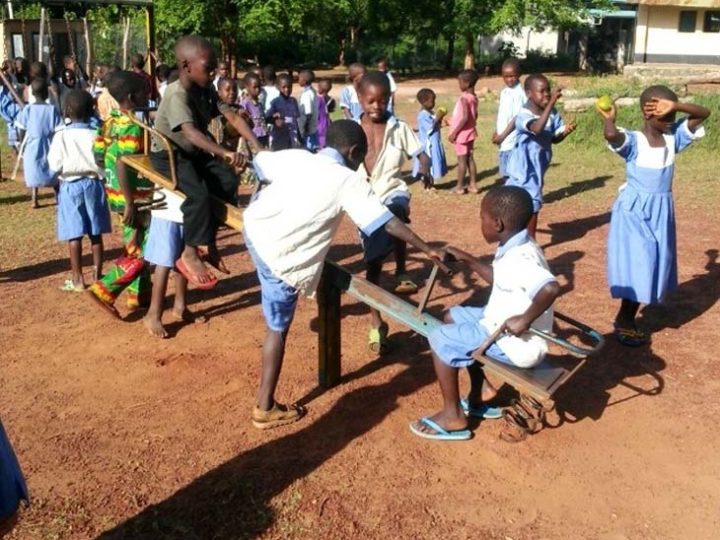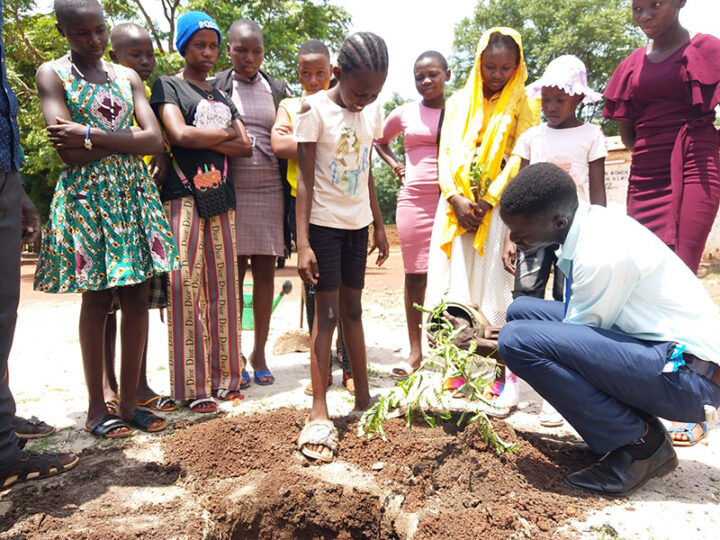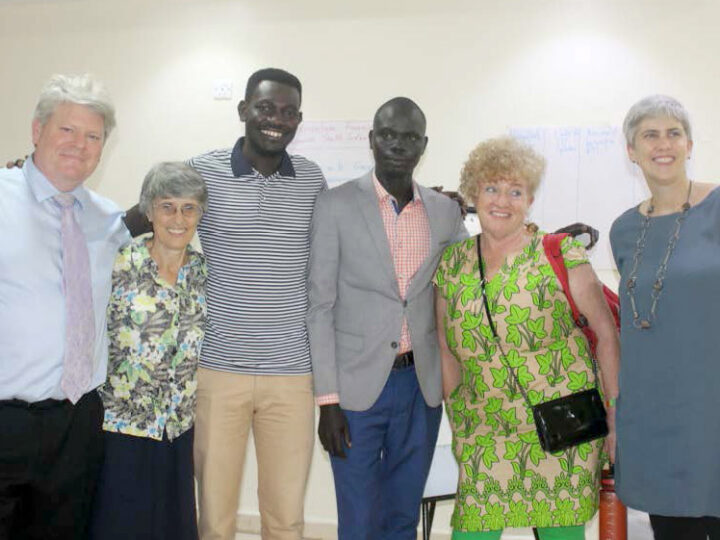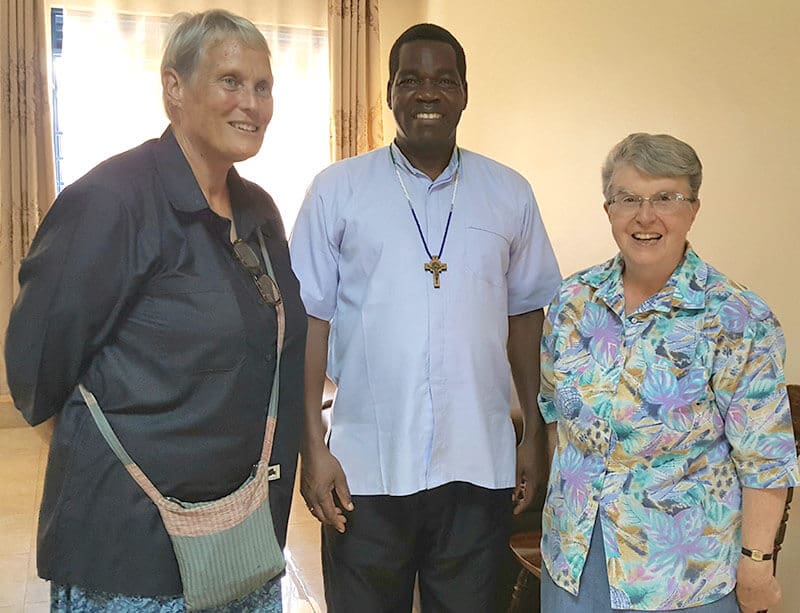
Very special greetings to all of the supporters of Solidarity with South Sudan and Friends in Solidarity. I am in South Sudan visiting the projects that you support. Gratitude for your support of the work of Solidarity abounds.
My first stop on the “tour” was a visit to Riimenze, a rural community served by the Solidarity Agricultural Training Project. This 75-acre farm teaches local farmers in the use of appropriate technology and organic methods and includes growing of plants, animal husbandry and a fishery. Storage and drying methods have been introduced for value-added production of coffee, cow peas, groundnuts and green gram.
Sister Rosa Le Thi Bong, RNDM, from Vietnam is the “primary motivator” for the 50 farm families engaged in the process. Her outreach includes 800 farmers in the surrounding area. The farm also employs day laborers from the internally displaced persons (IDP) camp of 3,500 people from 800 households who are too fearful to return to their own plots of land to rebuild their lives. Just when they get up enough courage, a local attack by rebels or thieves sets them back. Such attacks occurred while I was with the Solidarity team in Riimenze.
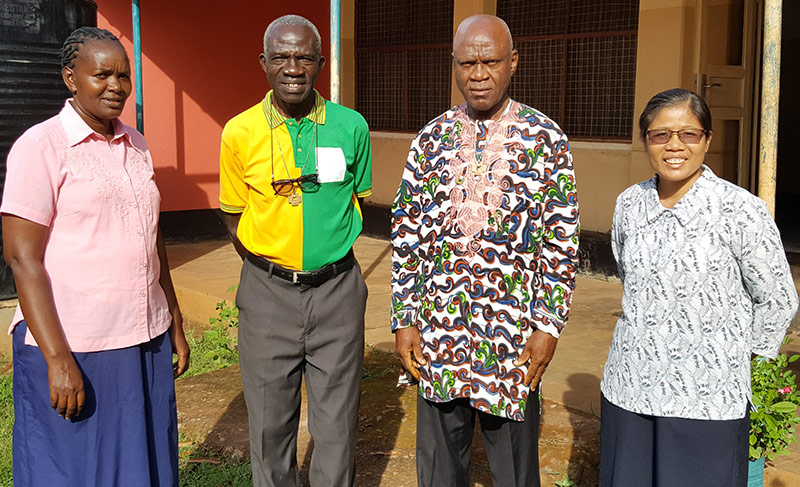
Solidarity team in Riimenze: Sister Josephine Murugi, RNDM; Brother Christian Mbam, FMS; Brother Uche Dimgba Longinus, FMS; and Sister Rosa Le Thi Bong, RNDM
Solidarity also supports the local primary and preschool and, through the generosity of a congregation of women religious, employs qualified teachers from the Solidarity Teacher Training College in Yambio. The improvement since July 2018 is tangible.
The road to Yambio is not for the faint of heart. Deep ruts filled with mud and water can swallow a small car, making travel by Land Cruiser essential. Even big trucks can turn over in such “pot holes.”
Leaving the road to enter the Solidarity Teacher Training College (STTC) is a pleasure. The college is a place of peace, beauty and organization. Students are learning and taking class work seriously.
STTC Campus from Friends in Solidarity on Vimeo.
A visit to the computer lab with new computers, compliments of the Hilton Fund for Sisters, demonstrates the seriousness of the learning taking place. Students are learning computer and typing skills and how to access online materials for classes. Unfortunately, Internet availability is severely limited for research.
The STTC is facing major changes in the coming year as the South Sudan Ministry of Education is initiating a new curriculum which will radically alter how teachers are trained and how students learn. The old curriculum, for which Solidarity developed teaching materials, was knowledge-based. The new curriculum is competency-based. The curriculum emphasizes the complex outcomes of the learning process, i.e knowledge, skills and attitudes to be applied by the learner rather than subject content.
Solidarity staff will integrate this into their methods, but it will mean more micro-teaching in smaller, demonstration classes. This will necessitate the need for more teachers, and more, but smaller classrooms. The Ministry is even proposing the building of demonstration schools! In addition, current teachers will need to return to school for in-service programs on implementing the new curriculum. Solidarity staff and STTC tutors have their work cut out for them.
The last stop on the tour was the Catholic Health Training Institute (CHTI) in Wau, the second largest city in South Sudan. Once a city of ethnic diversity, it has been a place of ethnic conflict over the past four years. Such conflict impacts students with families living in the area. Still, the CHTI student body is made up of people from many of the ethnic groups in South Sudan, and graduates are scattered around the country and in Abyei and Nuba Mountains in Sudan. Thirty-seven registered nurses and midwives are expected to receive their diplomas next week.
Women make up nearly 50 percent of students at CHTI, which is building a new dorm to accommodate female students. Since only 18 percent of women in South Sudan are literate, this is an unusually balanced student body. Graduates with whom I spoke with were enthusiastic about the education they have received, the practical skills learned, and the friends they have made across ethnic boundaries. An annual Cultural Week encourages the sharing of music, dance and food across ethnic groups.
As I write this, I am about to leave for Rome to attend the Solidarity with South Sudan Assembly of its members and to meet with the Solidarity board of directors. The board is the group that sets the policy and strategic plan for the organization. The challenges are many, and the times so different from 2006 when the decision was made by the International Union of Superiors General (women religious) and the Union of Superiors General (men religious) to take on this unique ministry of building the capacity of the people of South Sudan. They need our prayerful support moving forward.
We thank you for your interest and continued support through Friends in Solidarity. Happy Thanksgiving!
Sister Joan Mumaw, IHM
President and Chief Administrative Officer
Friends in Solidarity
Above photo (from left): Sister Margaret Scott, RNDM, principal of Solidarity Teacher Training College; The Rev. Edward Hiiboro Kussala, bishop of Tombura-Yambio, and Sister Joan Mumaw, IHM.
To see more photos and videos from Sister Joan’s time in South Sudan, follow Friends in Solidarity on Facebook, Twitter and Instagram.


